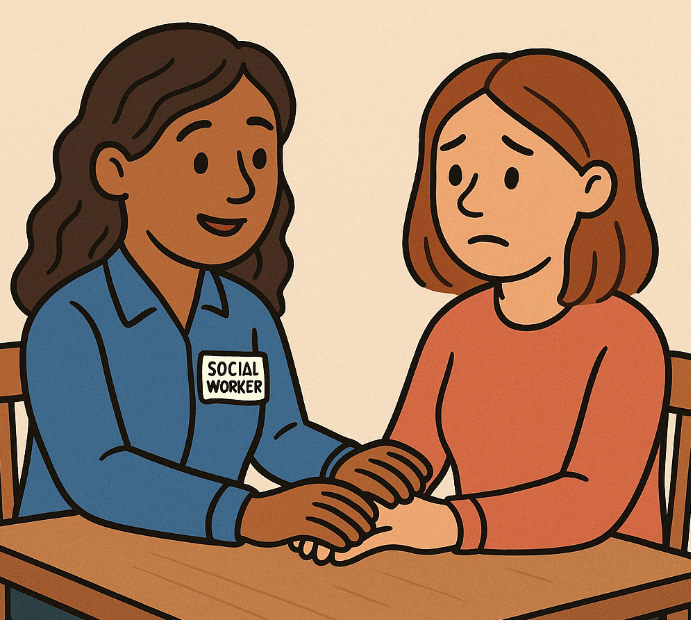
Only 1 in 9 Social Workers Had Real Support
“You have to put yourself first to be an effective worker.”
That might sound like advice from a motivational speaker, but it came straight from a Scottish social worker—one of nine interviewed in a groundbreaking new study on how social workers define, experience, and attempt to implement self-care. The results? Self-care is essential—but often impossible.
As the world increasingly asks frontline professionals to do more with less, this research reveals a troubling disconnect between what social workers need for their mental health and what their institutions actually support. Spoiler: a weekly mindfulness memo isn’t cutting it.
Let’s unpack what the study found—and why it matters for the future of public health.
What Is Self-Care, Really?
The social workers in this study weren’t clueless about self-care. In fact, they had a deeply nuanced understanding of it. They saw self-care as more than bubble baths and breathwork; it’s about setting boundaries, decompressing after emotionally draining days, and maintaining enough internal balance to keep serving others without losing yourself.
As one participant put it:
“Self-care is just a massive term to me… it’s what you’re doing when you’re decompressing after work.”
Since COVID-19, many have become more aware of the need to recharge. But awareness doesn’t always lead to action—especially when organizational culture quietly punishes people who say “no” to overtime or prioritize their mental health.
The Implementation Paradox
Here’s the kicker: Even when social workers know they need self-care, they often can’t do it. Why? Because the structure of the job actively works against them.
Workloads are overwhelming. Boundaries blur—especially with remote work. And organizations may say the right things (“We care about your wellness!”), but fail to offer meaningful support.
One participant nailed it:
“My organization wants us to do self-care, but not proactively enough to truly enable us.”
This contradiction—between what social workers are told they should do and what they’re realistically able to do—is what the study calls the Implementation Paradox. And it’s taking a toll.
From Individual Hustle to Collective Care
Some participants found small ways to prioritize self-care: walking after work, hobbies, or saying “no” without guilt. But these coping strategies were deeply personal, often developed over years of trial and error. And they came with a cost—mainly, the sense that support systems weren’t really there.
The study highlights a major shift in thinking: self-care shouldn’t be a DIY project. It should be built into the workplace culture. Supervisors should model and encourage it. Training programs should prepare future social workers with hands-on, practical skills—not just stress the importance of “balance.”
“We need support when we say, ‘I’m at burnout point.’ Not just a poster about resilience,” one participant said.
This study joins a growing movement calling for collective approaches to wellbeing—where responsibility isn’t just on the worker, but also the system they’re part of.
Culture Matters—So Does Context
A fascinating insight emerged from a participant who grew up in a culture where talking about “self” was frowned upon. For them, self-care felt selfish, even taboo. This underscores a crucial point: any self-care framework must be culturally sensitive. What works in one context might not resonate—or might even backfire—in another.
This isn’t just about workplace yoga. It’s about challenging deeply held cultural norms and building inclusive, compassionate systems that understand the diversity of their workers.
Why This Matters for Public Health
We often talk about burnout like it’s a personal failing. But this study flips the script: burnout is a system failure.
If social workers—key players in the public health ecosystem—can’t sustainably care for themselves, it doesn’t just hurt them. It hurts the communities they serve. It strains healthcare systems. And it risks turning helping professions into high-turnover zones of chronic stress.
Investing in systemic self-care isn’t fluff—it’s foundational public health policy.
What’s Next?
This study was small (just nine social workers), but mighty. It offers a blueprint for what sustainable self-care could look like:
- Regular, meaningful supervision with space to talk about wellness
- Culturally responsive training in self-care practices
- Leadership that models and supports boundaries
- Policies that prioritize practitioner wellbeing as a public health issue
If institutions want to retain their workforce, build resilient systems, and deliver quality services, they can’t just talk about self-care. They need to fund it, normalize it, and embed it.
Let’s Explore Together
How does your workplace support (or ignore) self-care?
What would true, systemic support for your mental health look like?
How might cultural background shape your views on self-care?
👇 Share your thoughts in the comments or tag us on social media using #SelfCareIsSystemic.
Let’s stop asking frontline workers to be superheroes. Let’s build systems that don’t require superpowers just to survive.
Critical science is unfolding—are you in the loop?
Each week, This Week in Public Health delivers need-to-know insights that shape policy, practice, and community health. If you’re not reading it, you’re already behind.👉 Subscribe for free now to stay ahead.
📢 Share this blog—someone you know needs to see it too.



